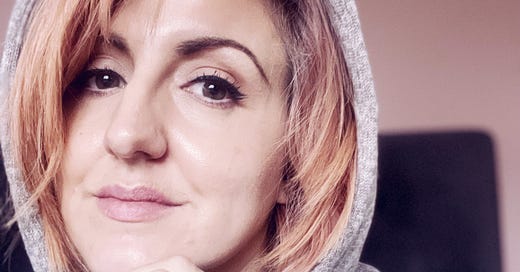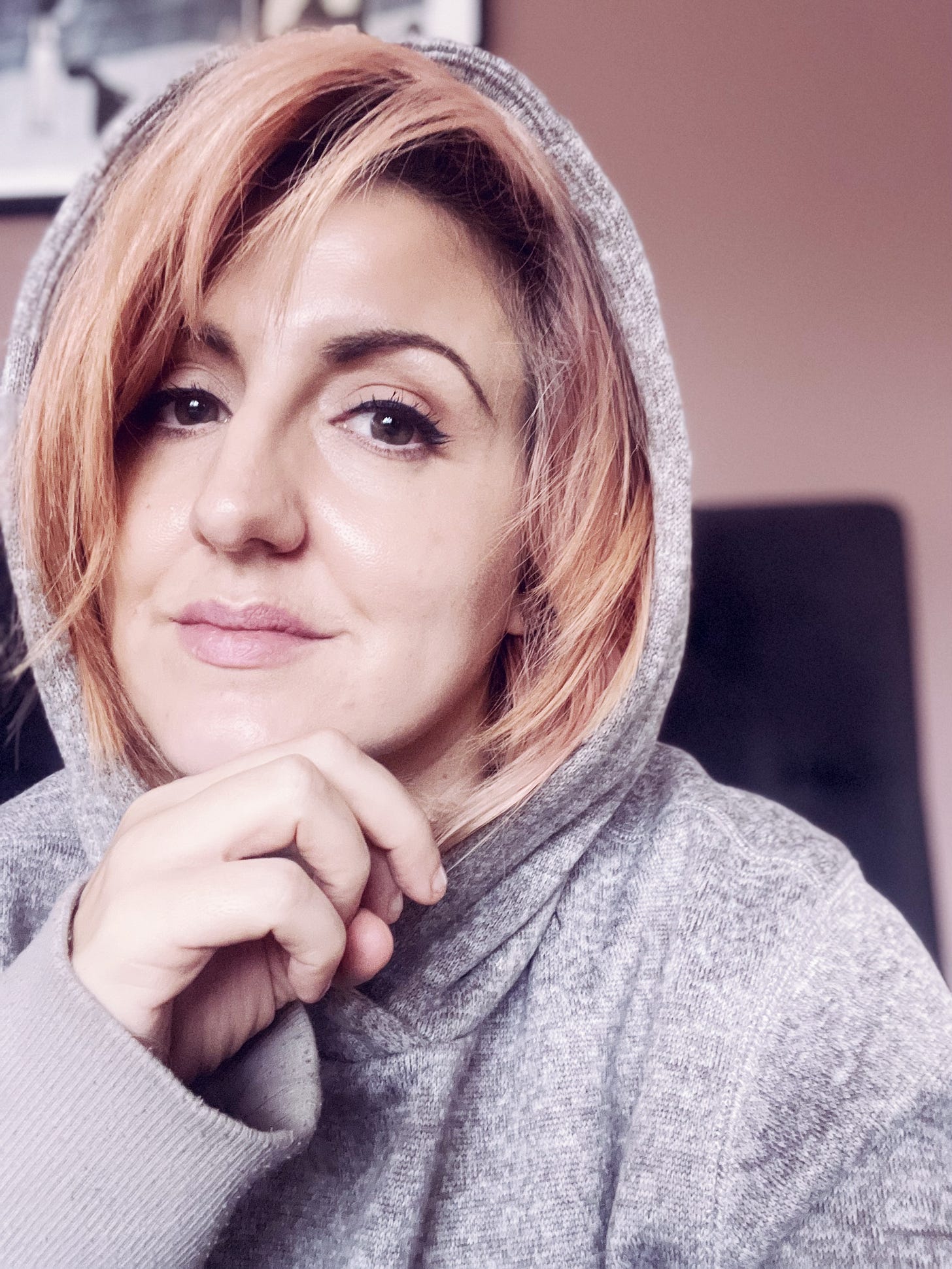Thoughts after my first therapy since my husband died
(and the big problems with life writing)
This week, I saw my therapist for the first time in six years.
I’ve seen MANY other therapists over the years (as I wrote about a few weeks ago) but Eliza is definitely my favourite. I don’t know if you’re supposed to acknowledge that out loud, much like how teachers aren’t supposed to have favourite students (but absolutely do).
For these sessions, Eliza and I are talking online instead of in-person. I felt my body physically relax when her familiar face appeared on the screen.
I could write point-for-point everything we talked about, but it would be long, drawn out and despite what readers of my work might assume, I really don’t disclose everything I feel and think. What I can tell you are the highlights (or lowlights, depending on your point of view) which is very much like therapy itself; an hours session of non-stop talking may leave you with one killer line that encapsulates it all, the one you leave with and can’t stop thinking about.
For me, this session’s line was “But where are you?”
**********************
I talked about my kids, my job, my house and the garden room I’m building in order to give us all some more space. Oh and did I tell you I got a new puppy?! She’s so much fun and injected some much needed energy into the house. I’m trying to fill in some of the blanks she’s missed over the eventful last six years.
Eliza is silent. She knows my work, she’s read my book and still, she asks the most important question; probably the one I’ve not wanted to ask myself and worked fucking hard to make sure no one else asks me.
“Yes, but where are you?” Eliza asks.
It is this question that unravels me. Because I thought I knew and now I realise I absolutely don’t.
I naively believed writing about my life in a memoir was therapy in itself. I thought the act of physically scrawling words down in a notebook then reforming into ordered chapters was the equivalent of sitting with a therapist and being asked to unpack the overwhelming question “How do you really feel about your husband dying?”. I thought I’d spent 337 pages answering that question.
Annoyingly, it turns out life writing is not therapy, not in the slightest. The exploration of that question looks very different in an intimate and confidential one-to-one, compared with writing for thousands of people to consume.
The problem with life writing is that it flattens. It’s like trying to recount a particularly vivid dream; you can never quite capture the insanity. Even the best memoirs take the chaos of lived experience and distill it into a story with a rough beginning, middle, and end. There is a strange alchemy that has to happen when you turn real life events into words people can read. There has to be some kind of metabolism of feeling, a way to process experiences so abstract and overwhelming into a cohesive and logical idea. Before it ever meets the page, it has to be filtered down into something digestible, something that raw and chaotic trauma rarely does.
The problem comes when once it’s written down like that, you can start to believe this 2D version of events. This can be seductive because it offers cohesion when you desperately need some solid ground to stand on.
That is not to say what I have written isn’t true or a performative version of events. Everything I’ve ever explored has come from an authentic attempt to paint a picture of the intense yet absurdly nuanced ways life feels.
I have perfected the details of my ‘story’ over time and can rattle them off like reciting the time tables with little emotion attached, desensitised to the trauma underneath it. I can control this narrative, keeping the elements bearable and contained.
“Yes, but where are you?” Eliza asks again.
Where am I? In my head, I am sat alone in an empty grey room.
*******************
I can’t see anything past the walls of this room. I can’t envision a future for myself or conjure up any dreams or plans. It feels as though cold sheets of metal have been pulled down around me to shutter out the world.
In this room, I feel nothing. Not the apathy of depression or the flippancy of indifference. More like the blank emptiness of a lobotomy.
In contrast, my external world is full of colour and chaos; blue hair, a red puppy, pink walls, blue eyed girls. But my internal landscape is barren and bleak.
Eliza reminds me of a conversation we’d had years ago, when she asked me ‘Is Greg the one who is going to die, or you?’ and I had burst into tears. Her question referenced my manic need to hold the emotions of everyone around me, organise wills, phone specialists, quiz consultants. I became a machine whose goal was to try and keep everyone alive, not realising I was burying myself.
The years of being super charged has become ingrained in my bones and, in some ways, has needed to be as the only parent left to two small children. While this might all seem very admirable from the outside, my need to be capable is powered by a desperation for control. My anxiety at not capable runs through everything I do and has become so extreme, it’s noticed and commented on – from my worried line manager suggesting I need to ask for more help, to my agent’s feedback that the detailed marketing plan I’d written for my publishers was in fact their job, to my daughter’s school praising me for turning up every day with her to support her return to school after two months absence with anxiety.
Again, on paper, this might look like the actions of someone who is hard working and diligent. Perhaps. But if I answer the question “yes, but where are you?”, the answer is I am trapped alone in my steel grey room, terrified of life and grasping on as tightly as I can to everything because I don’t trust the universe to not fall in on itself.
This mistrust is so intense and fertile, it has sown a new seed of terror; that my daughters will grow up to hate me, that all my good intentions and effort will be lost in translation. I can hear them as adults, sat in front of their own therapist, exclaiming “But why couldn’t have just done more for me?”
There is no one I try harder for but I feel it is my daughters who I let down the most. It’s them who see me at my weakest, within the safe cocoon of our home. Since Greg died, the girls have seen me in a light I balk at; panic attacks that render me useless on all fours like a dying animal, crying fits where I need to sit alone at the end of the garden.
There is very little in my life I feel ashamed for, except this. To be there in every way possible for them leaves me empty and broken, because I have so few ways of topping up my own needs. I know the only way to continue being a well rounded, rational, fair and loving parent is if I can live in ALL the roles of my life. But still…
“But where about you, as a woman?” Eliza asks me.
Here is a thought I have barely let myself consider. The idea of another relationship, and what it would take to let myself open up in the way love needs to flourish, leaves me blank. I can see how trauma has cranked the lever of the steel shutters around my heart, in a bid to protect me. I can also list all the very real external reasons against meeting someone else – my children would hate it, dating apps scare me, I can’t deal with the scrutiny – but more honestly, I haven’t even begun to process the deep sense of fear around love since Greg was diagnosed with terminal cancer and our relationship began to corrode. It is all so multilayered, so deeply messy and painful that I don’t know where to begin. Also, I just don’t know if I have the emotional reserves to delve into such murky water and still get up at 6am to let the puppy out and make breakfast.
Some personal discussion about why therapy is so hard, interspersed with shouting at the dogs for getting into a bucket of water, then digging up the garden.
Urgh. Life is tricky.
And yes – I understand the irony of then dissecting this session through life writing.
As ever, onwards…
X Stacey






This is a brilliant, honest and eloquent piece and describes perfectly the utter bewilderment of being a young (ish! I am 51!) widow so older than you! I can empathise with all of it, having lost my husband to cancer 9 months ago.
Beautiful, powerful words. Thank you for letting us glimpse where you are x